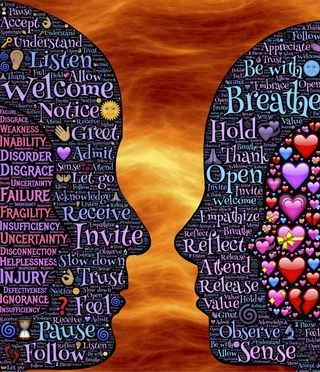Resilience
Feeling Stuck, Lost or Overwhelmed? There is Hope
‘Mentalizing’ holds the key to greater happiness and resilience.
Posted February 21, 2017

Your situation may not be as dire as it feels. Whether you are facing a health crisis, an untenable work situation, or intense marital struggles, you can respond in ways that make an “impossible” situation manageable; or that make it even worse. People who do best at navigating all of these life challenges have an important trait in common: they are strong mentalizers. Mentalizing is an ability to really “get” yourself and others. And the better people are at mentalizing, the better they are at maintaining a positive sense of themselves, developing strong relationships, and being resilient during times of difficulty.
The concept of mentalizing has been explored and developed as a basis for therapy by the well-respected researchers and clinicians Anthony Bateman and Peter Fonagy. They have noted that people who mentalize well are able to see themselves from an outside perspective – as others see them – and see others from the inside perspective, with a sense of what is motivating them. Having these perspectives has many benefits, such as having a greater ability to:
- Understand yourself, enabling you to avoid or more quickly recover from problematic patterns
- Have empathy
- Have compassion for yourself and others (Compassion is having empathy for, and a desire to help, a person in pain.)
- Clarify miscommunications
- Resolve differences with others
- Effectively communicate your thoughts, feelings, and desires
- Maintain emotional balance even during difficult times
- Manage your feelings
- Help regulate other people’s feelings
Unfortunately, even the best mentalizers face stressors that undermine their abilities. You might find that you slip into non-mentalizing when you’re tired, hungry, sick, or overwhelmed with too many or too high expectations. It is also likely to happen when your emotions overwhelm you, whether they are positive ones – such as being happy or in love – or negative ones – such as being scared or angry. Some signs of poor mentalizing are when you are:
- Unable to feel your emotions, and are instead living in your head
- Unable to think clearly, and are instead blinded by your emotions
- React in a way that is out of proportion to a situation
- Unable to understand your own reactions, or even be curious about them
- Feel the need for constant validation and reassurance by others
- Unable to empathize with someone else
- Sure about someone’s intentions, unable to consider other possibilities
- Thinking in absolutes, such as “always” and “never”
- Focused on external events or explanations, not even factoring in someone’s inner experiences
The good news is that if you recognize that you are mentalizing poorly (or are likely to in a given situation), you can then work on changing it. In fact, even just recognizing that you need to reconsider how you are reacting is a step toward better mentalizing. Good mentalizing requires flexibility in how you relate to experiences. For example:
- If you feel overwhelmed by emotion, choose to think more about the situation. You may need to actively calm your emotions first, such as by exercising, taking some deep breaths, or distracting yourself briefly.
- If you notice that you are thinking fine but seem disconnected with your emotions, try focusing on how you feel in your body and then observe any emotions that might arise.
- Reconsider your beliefs if you are thinking and talking in absolutes, such as “You never care about what I want…” Such extreme statements are rarely true. What is a more realistic, and nuanced, appraisal of the situation?
- If you are feeling needy of validation, take the time to reflect on your thoughts and feelings. You may find that you initially need the support of someone you trust, but be sure to return to your own assessment of the situation.
- When you are sure about why someone acted in a particular way or just accept a situation as it is without understanding it, choose to be curious. Think about various possible explanations, motivations, and influences.
Mentalizing is a skill that you can improve with practice. Over time, you can learn to mentalize more often, more fully, and return to it more quickly after you’ve slipped into a more nonmentalizing stance. When you are mentalizing, you will probably notice that you feel more grounded, at peace within yourself, and happier in your relationships.
__________
For information on four basic dimensions of mentalizing, see these articles:
Feel Like a Repeating Train Wreck? Learn to See It Coming
Common Downfalls: Thinking and Feeling Too Much
Finding Happiness Through Connection
Happy & Resilient: Balancing Yourself and Your Relationships
Leslie Becker-Phelps, Ph.D. is a clinical psychologist in private practice and is on the medical staff at Robert Wood Johnson University Hospital, Somerset in Somerville, NJ. She is also a regular contributor for the WebMD blog Relationships and is the relationship expert on WebMD’s Relationships Message Board.

Dr. Becker-Phelps is also the author of Insecure in Love and consultant psychologist for Love: The Art of Attraction.
If you would like email notification of new blog postings by Dr. Becker-Phelps, click here.
Making Change blog posts are for general educational purposes only. They may or may not be relevant for your particular situation; and they should not be relied upon as a substitute for professional assistance.
Personal change through compassionate awareness




